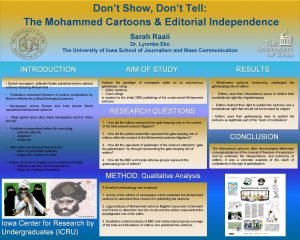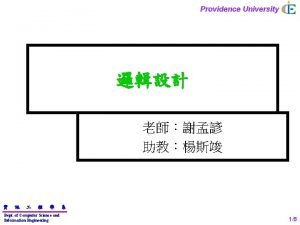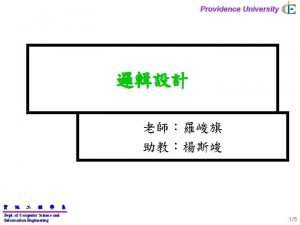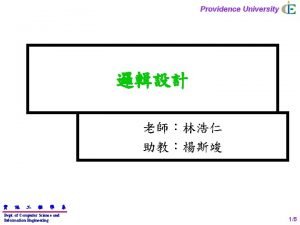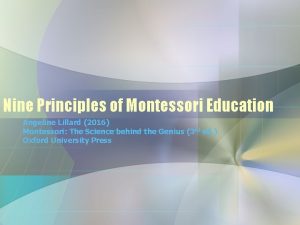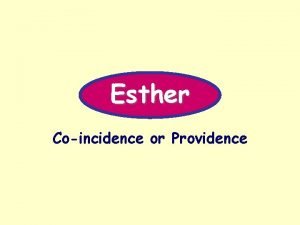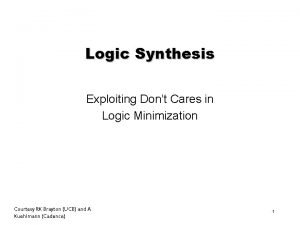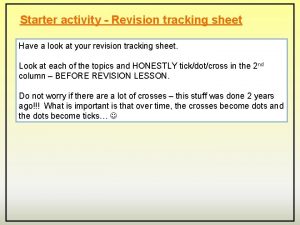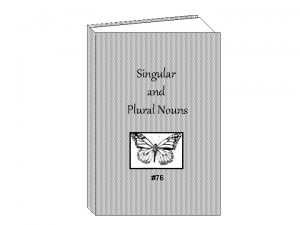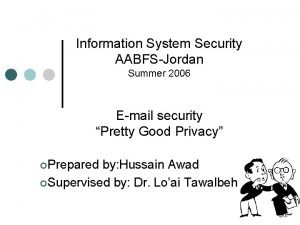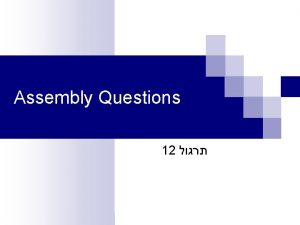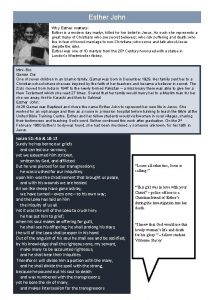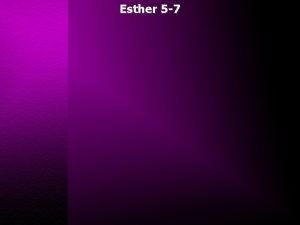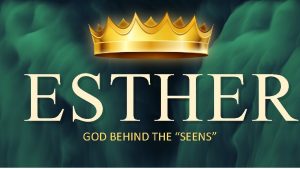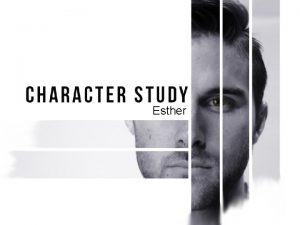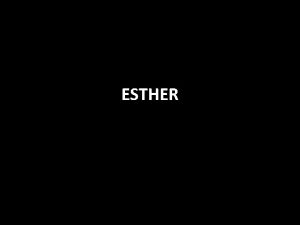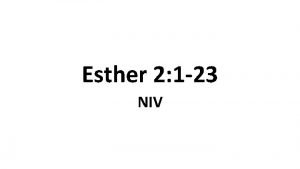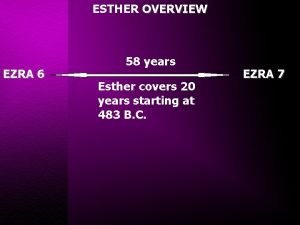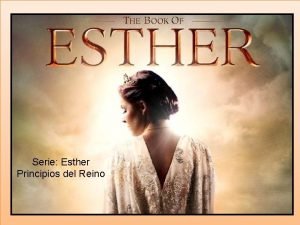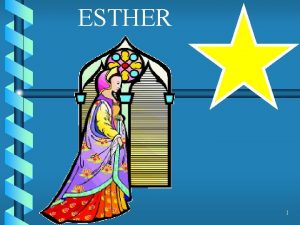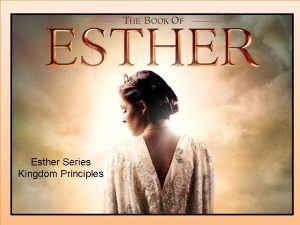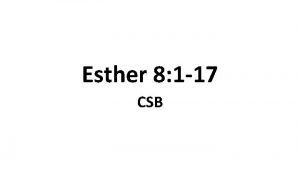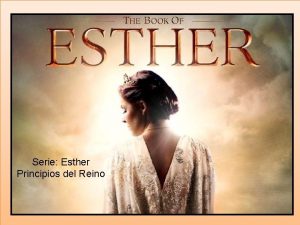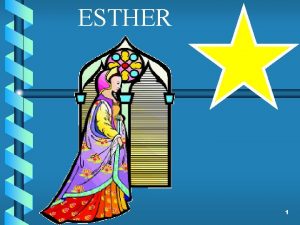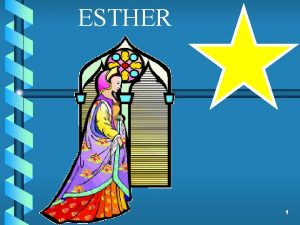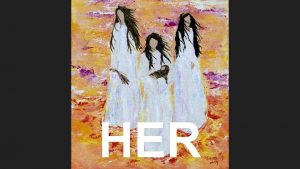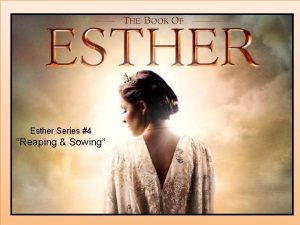Providence Esther Providence Introduction Providence Introduction We dont







































- Slides: 39

Providence Esther

Providence Introduction

Providence Introduction • We don’t always see it. We usually don’t notice. • We may not know how or why, but God is always working.

Providence Introduction • John 5: 17 (NIV) … Jesus said …, “My Father is always at his work to this very day, and I too am working. ” • (NLT). . Jesus replied, “My Father is always working, and so am I. ”

Providence Definition

Providence Definition Although providence is not a biblical term, both the OT and NT set forth an understanding of God’s gracious outworking of the divine purpose … – The Pocket Dictionary of Theological Terms

Providence Definition … The world and humanity are not ruled by chance or by fate but by God, who directs history and creation toward an ultimate goal. … – The Pocket Dictionary of Theological Terms

Providence Definition … Providence therefore refers to God’s superintending activity over human actions and human history, bringing creation to its divinely determined goal. – The Pocket Dictionary of Theological Terms

Providence The Book of Esther

Providence The Book of Esther • This is the second book in the Bible named after a woman. • In it, God is not mentioned by any name or title. • Prayer is not mentioned, though fasting is and probably implies it.

Providence The Book of Esther • Author: Anonymous • Subject Matter: The Story behind the Feast of Purim • Time Period: Approximately 486 – 485 B. C. , the generation before the events of Ezra-Nehemiah. • Key verse: Esther 4: 14

Providence The Big Idea of the Book

Providence The Big Idea of the Book • God never stops working. • When he seems least visible and you feel you need him most – he may be most active of all.

Providence The Book of Esther

Providence The Book of Esther Four Main Characters: • Ahasuerus (Xerxes) King of Persia • Haman the Agagite, committed Jew-hater • Mordecai the Jew • Hadassah, or Esther, his young cousin who becomes Queen

Providence Esther 1 Read 1: 1 -3, 10 -15 and 19

Providence Esther 2 Read 2: 1 -7, 16 -17 and 19 -23 • The king and various royal big shots think they are in charge. • They are not. God is in charge.

Providence Esther 3 Read 3: 1 -2 and 5 -11

Providence Esther 3 Read 3: 1 -2 and 5 -11 • A decree goes out that on a certain day the Jews should be destroyed. • Haman thinks he is in charge. • He is not. God is in charge.

Providence Esther 4 Read 4: 1 -17 Remember that 4: 14 is our key verse.

Providence Esther 5 • Esther comes before the king and he holds out the golden scepter. • She invites the king and Haman to a banquet that she has prepared. • Haman’s arrogance reaches new heights. Read 5: 9 -14

Providence Esther 6 Read 6: 1 -11 • The tables are beginning to turn.

Providence Read 7: 1 -10 Esther 7

Providence Esther 8 Read 8: 1 -3, 7 -12 and 15 -17

Providence Read 9: 23 -31 Esther 9

Providence Esther 10 Read 10: 1 -3 God was in charge.

History Repeating Itself

History Repeating Itself Rudolf Hoess, Commandant of the Auschwitz Death Camp in Poland • Conflicting reports in the 1940 s put the death toll at Auschwitz anywhere from 1. 5 – 5 million, mostly Jews.

History Repeating Itself Rudolf Hoess, in custody after the war. • The British captain over the team that caught him was a Jew.

History Repeating Itself Rudolf Hoess, at his trial • When accused of murdering 3 ½ million people, Hoess answered, • "No. Only 2 ½ million – the rest died from disease and starvation. ”

History Repeating Itself • Auschwitz, April 16, 1947. • Like Haman, he was hanged on his own gallows. • Haman might have warned him. • God was in charge. • A year later, Israel became an independent state.

Providence Conclusions

Providence Conclusions • God was in charge in the days of Esther and Mordecai. • God was in charge when the plans of the Nazis all fell apart. • God is in charge today.

Providence Conclusions Providence … refers to God’s superintending activity over human actions and human history, bringing creation to its divinely determined goal. – The Pocket Dictionary of Theological Terms

Providence Conclusions Galatians 4: 4 -5 4 But when the fullness of time had come, God sent forth his Son, born of woman, born under the law, 5 to redeem those who were under the law, so that we might receive adoption as sons.

Providence Conclusions • Are we willing to trust him in a world threatened by terrorism and chaos? • Are we willing to trust him in the personal circumstances that matter to us most?

Providence Conclusions • Are we willing to accept the fact that God still has a plan. • Are we willing to accept the fact that he has decided to include us in it?

Providence Conclusions • Esther, the Jewish orphan, was made Queen of Persia because God’s plan included her in that place and time. • His plan here and now includes you. • Are you ready for that?

Providence Conclusions • God never stops working. • When he seems least visible and you feel you need him most – he may be most active of all.
 Dont ask dont tell political cartoon
Dont ask dont tell political cartoon Don't laugh at me allen shamblin
Don't laugh at me allen shamblin Providence university taiwan ranking
Providence university taiwan ranking Providence college library
Providence college library What is the capital of new york
What is the capital of new york Greystone lofts
Greystone lofts Kevin manemann providence
Kevin manemann providence Providence engineering
Providence engineering Providence engineering
Providence engineering Providence engineering
Providence engineering Angeline lillard montessori
Angeline lillard montessori Coincidence or providence
Coincidence or providence Providence montessori school
Providence montessori school Righteous providence
Righteous providence What they don t know won t hurt them
What they don t know won t hurt them Pronom relatif
Pronom relatif Please dont eat my cookies
Please dont eat my cookies How does the cockle avoid the moon snail?
How does the cockle avoid the moon snail? Verilog dont care
Verilog dont care Qui que dont ou
Qui que dont ou Dont que qui
Dont que qui Masayasu wakabayashi meme
Masayasu wakabayashi meme Dont eat in class
Dont eat in class Clip clop and you dont stop
Clip clop and you dont stop I bet you
I bet you Dont eat in class
Dont eat in class All letters in sign language
All letters in sign language Excited show not tell
Excited show not tell Dont worry be happy notes
Dont worry be happy notes Sociology is the study of
Sociology is the study of Why don't water and oil mix
Why don't water and oil mix Dont look up tick
Dont look up tick Potato plural spelling
Potato plural spelling Show not tell examples
Show not tell examples Dont remplace
Dont remplace Que ou dont
Que ou dont I dont care ascii
I dont care ascii Dont count on people
Dont count on people Dont call my bluff
Dont call my bluff I dont care ascii
I dont care ascii
